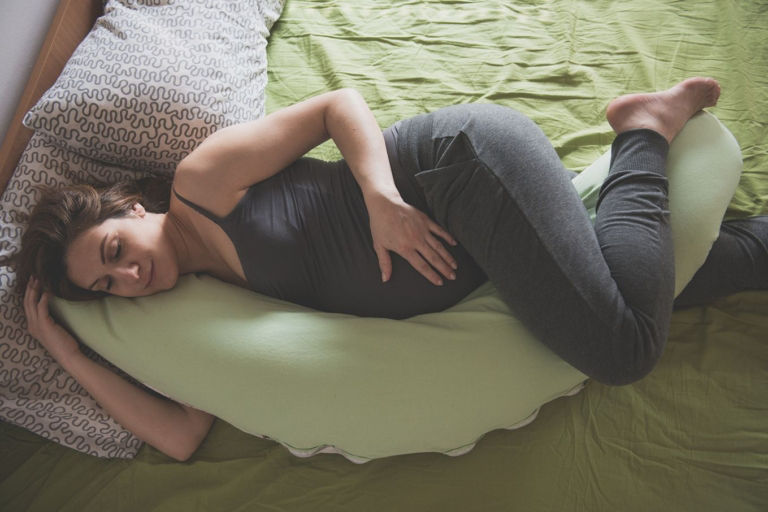From strange dreams and toilet trips to restless legs syndrome, there are plenty of ways your pregnancy may be keeping you awake at night. We look at practical solutions to tackle pregnancy sleep issues and help you get a better night’s sleep.
Getting a better nights sleep

Common sleep disruptions in pregnancy
A lack of sleep is a common complaint experienced by many pregnant women. But by making practical changes to your habits and routines you can lessen night wakings and make it easier to drift off.
Pregnancy heartburn and indigestion
Pregnancy heartburn can be caused by both the position of your baby and also hormonal changes1 which result in a more relaxed oesophagus (the ring of muscle at the top of your stomach which keeps food and acid down)2. Because heartburn is made worse by laying down, it’s a common culprit when it comes to keeping expectant mums awake at night.
If you suffer from indigestion you’re advised to eat no later than three hours before you go to bed1. So if you’re used to enjoying supper with your partner at around 8pm but you’re ready to retire by 9pm, adjust to your mealtimes and avoid rich, spicy or fatty foods1. If you’re woken by indigestion try sleeping in a more upright position using 2-3 pillows to help stomach acid settle. Keep indigestion tablets by your bed; some over the counter indigestion remedies (antacids) are suitable for use in pregnancy, but always check with your pharmacist or healthcare professional.
 Pregnancy sleeping pillows are designed to give support. Some are shaped to mould around your bump and body, while other small foam wedges fit snuggly between your knees to help reduce thigh cramps.
Pregnancy sleeping pillows are designed to give support. Some are shaped to mould around your bump and body, while other small foam wedges fit snuggly between your knees to help reduce thigh cramps.
Frequent toilet trips
Needing to wee regularly is a minor irritation experienced by most women in pregnancy. It happens because your kidneys begin to process more waste from both your baby and your increased circulation3. Later in pregnancy you may find you’re making frequent toilet trips as your growing baby presses on your bladder. The most you can do is drink plenty of water in the morning, and avoid drinking fluids close to bedtime.
Restless Legs Syndrome
Restless legs syndrome (RLS) is experienced by 1 in 5 pregnant women in their last trimester. It can manifest in involuntary leg movements which jolt you out of sleep, or a hot, itchy feeling that makes you feel the need to move around. In some cases, RLS is caused by an iron deficiency; if tests confirm this, an iron supplement recommended by your midwife may help4. Some mums say that a cold flannel or cooling peppermint lotion can also ease symptoms when they arise.
In some cases, restless legs syndrome is caused by an iron deficiency; if tests confirm this, your midwife may recommend an iron supplement to help⁴.
Tackling insomnia: sleep tips
Avoid using your phone or tablet before bed. It’s thought that the blue light emitted from electronic devices can delay the release of sleep-inducing melatonin and increase alertness.
Cut out caffeine. You’re advised to limit your caffeine intake to 200mg a day5 (2 cups of instant coffee or 2-3 cups of tea) but did you know that caffeine is also present in cola, energy drinks and chocolate? If you’re struggling to sleep keep an eye on your daily caffeine intake and try drinking herbal tea or decaf instead.
Invest in a pregnancy pillow. As your pregnancy progresses your growing bump can make it more difficult to turn over, and a limited sleeping position may lead to leg cramps, neck or joint pain. Pregnancy sleeping pillows are designed to give support. Some are shaped to mould around your bump and body, while other small foam wedges fit snuggly between your knees to help reduce thigh cramps. If you don’t want to go out and buy one, an extra pillow or even a small, plump sofa cushion in a pillow case can be used.
Drink water in the morning and throughout the day rather than in the evening to give your bladder time to empty before bedtime.
Get some fresh air every day. Exposure to sunshine will help to reinforce your body’s natural circadian rhythm.
Take daily gentle exercise. It’s thought that moving your body can reduce the occurrence of restless legs4. And whilst pregnancy exercise can make you feel less tired in the day6, it can also help you sleep better at night7. A prenatal yoga class may prove particularly relaxing before bedtime, but engage in more energetic exercise sessions (like going for a run) earlier in the day.
If you’re still suffering from insomnia and struggling with tiredness in the day, take a nap. A short, well-timed nap of around 20-30 minutes can improve alertness8. Make sure it’s earlier rather than later in the day to avoid disrupting your night-time sleep. The trick is to adapt your daily habits to reduce the symptoms that might be affecting your sleep routine.

Get in touch with our Careline experts
Our midwives, nutritionists and feeding advisors are always on hand to talk about feeding your baby. Need instant assistance? Our WhatsApp Customer Support team is here to help on-the-go!
1. NHS. (2017). Indigestion and heartburn in pregnancy. [online] Available at: https://www.nhs.uk/conditions/pregnancy-and-baby/pages/indigestion-heartburn-pregnant.aspx [Accessed 14 Feb. 2018].
2. Van Thiel, D., Gavaler, J., Joshi, S., Sara, R. and Stremple, J. (1977). Heartburn of pregnancy. Gastroenterology, 72(4), pp.666–668.
3. BabyCentre UK. (2015). Frequent urination in pregnancy. [online] Available at: https://www.babycentre.co.uk/a237/frequent-urination-in-pregnancy [Accessed 14 Feb. 2018].
4. NHS. (2015). Restless legs syndrome. [online] Available at: https://www.nhs.uk/conditions/restless-legs-syndrome [Accessed 14 Feb. 2018].
5. NHS. (2015). Limit caffeine during pregnancy - Health questions - NHS Choices. [online] Available at: https://www.nhs.uk/chq/pages/limit-caffeine-during-pregnancy.aspx [Accessed 14 Feb. 2018].
6. Gaston, A. and Prapavessis, H. (2013). Tired, moody and pregnant? Exercise may be the answer. Psychology & Health, 28(12), pp.1353-1369.
7. NHS. (2016). 10 tips to beat insomnia - Live Well - NHS Choices. [online] Available at: https://www.nhs.uk/Livewell/insomnia/Pages/insomniatips.aspx[Accessed 14 Feb. 2018].
8. Sleep Foundation. (2018). Should you Nap?. [online] Available at: https://sleepfoundation.org/insomnia/content/should-you-nap Accessed 14 Feb. 2018]
Last reviewed: 12th February 2018
